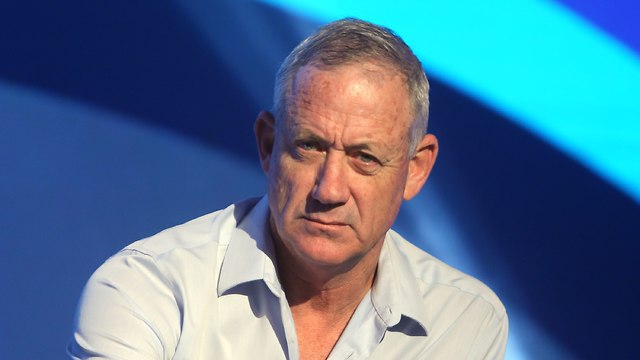
You say it best, when you say nothing at all
Opinion: Benny Gantz hasn't uttered anything of import so far, but it didn't stop the right from branding him a leftist. His campaign is in no rush to have the IDF chief-turned-politician talk about the burning issues, as his silence is seen as an asset and close associates believe he is ready to take on Netanyahu.
It really is a mystery how someone who has yet to officially announce his candidacy and who has not uttered a single sentence about his positions, can so dramatically influence the political system. I'm sorry, on Thursday he did come out with a video in which he does say one single sentence. A sentence not a single candidate, in the right or the left, won't sign off on: "To me, Israel before all. Join me and we'll go on a new path. Because we need something different, and we will do something different." He signed off with a smile, naturally, saying: "I think I spoke too much."
It's hard to learn anything about the man from all of this, but we could learn a lot about large portions of the public. About the longing for someone who will shake up the system and offer something new. About the fear on the right of anyone who may offer an alternative to their rule. About the confusion and uncertainty in the left over someone who may take all of their votes.
Leftist—that must have been the shortest talking points document coming out of the official Prime Minister's Residence. One after the other, serious politicians stood in front of the cameras, and all they had to say about the shortest 50 seconds and the most predictable sentences Gantz made, was that he was a leftist.
It was reminiscent of a story President Reuven Rivlin once told. It was in 1996, during Netanyahu's first term as prime minister. One day, Rivlin (then a member of the Likud Party) was urgently called to see the prime minister. "You are one of the people who appear on TV more than anyone else," Netanyahu told Rivlin. "From now one, when you're on TV, it doesn't matter what you are asked, you say 'Shahak is a leftist.'"
Amnon Lipkin-Shahak, the IDF chief of staff at the time, was already marked as the next threat to Netanyahu. Netanyahu, apparently, saw himself running against the popular and impressive Shahak in the next elections.
Different times, different people, but it's the same system. Except that at the time, Rivlin refused to cooperate. He was so shocked by Netanyahu's request, that it took his breath away. "What do you mean?" he asked Netanyahu. "What is this? Is he a traitor? After all, he's the people's IDF chief."
"You know nothing about politics," Netanyahu told him.
It appears Netanyahu is now surrounded by people who understand politics; those who shamelessly chant their master's song. What is clear is that it doesn't matter what Gantz chose to talk about—be it the Nation-State Law or the weather—the reaction would've been the same. A choir chanting in unison: Leftist.
It's hard to say that these accusations pushed Gantz to come out with more statements to the media. His campaign is taking their time. His close associates believe his silence is, at present, an asset. They now have one challenge: to bring his popularity as a prime ministerial candidate to the party he heads. His support as a prime ministerial candidate is very close to the support Netanyahu enjoys. The kind of support no one running against the prime minister has had in years. But it's not enough for him to win the elections. As far as his party is concerned, he is not yet in the lead, and polls last week even showed that Yair Lapid was ahead of him. His campaign officials believe they will be able to gain in the number of Knesset seats, and even get more than 20 seats. Everything, they believe, plays in their favor: the momentum, the trend, social media and the public desire.
Gantz, they say, is completely prepared for the race for the premiership. His party has organized activists, youth activists and party branches across the country. They're not worried about what's ahead. They believe the Likud Party has already brought out its big guns: Operation Protective Edge, the October 2000 death of Cpl. Madhat Yusuf —Gantz's associates are wondering how low the right can still go. They say Gantz has already foreseen everything, that he wants to understand the consequences of everything done by his campaign. This was what happened last week, when he came out of his home to meet with the Druze protesters.
Gantz's campaign officials promise he still has surprises in store. Last Monday he was branded as a leftist. The next day, when a clarification was issued on his behalf saying he was in favor of the Nation-State Law, he was accused of flip-flopping. His associates stress: We didn't flip-flop, and we didn't change anything. The Nation-State Law, at its core, is a good thing, but it requires some amendments.
The surprise Gantz is preparing us, according to his close associates, is the way in which he sees the different issues on the public's agenda: not through the traditional prism of a division between the left and the right. Some issues reside in a space shared by both camps, like the rule of law, democracy, the Druze community, LGBT rights, the media. Unlike Netanyahu, they say, Gantz wants to draw in every Israeli who thinks we need strength and might against our enemies, but not against the Israeli public.
Meanwhile, behind the scenes, talks on collaborations continue. It's clear that no agreement will be reached, if at all, before February. Until then, we can expect a lot of rumors, meddling, and leaks. Not that it matters. We won't remember who said what anyway, or how many of the promises made were actually kept.




















